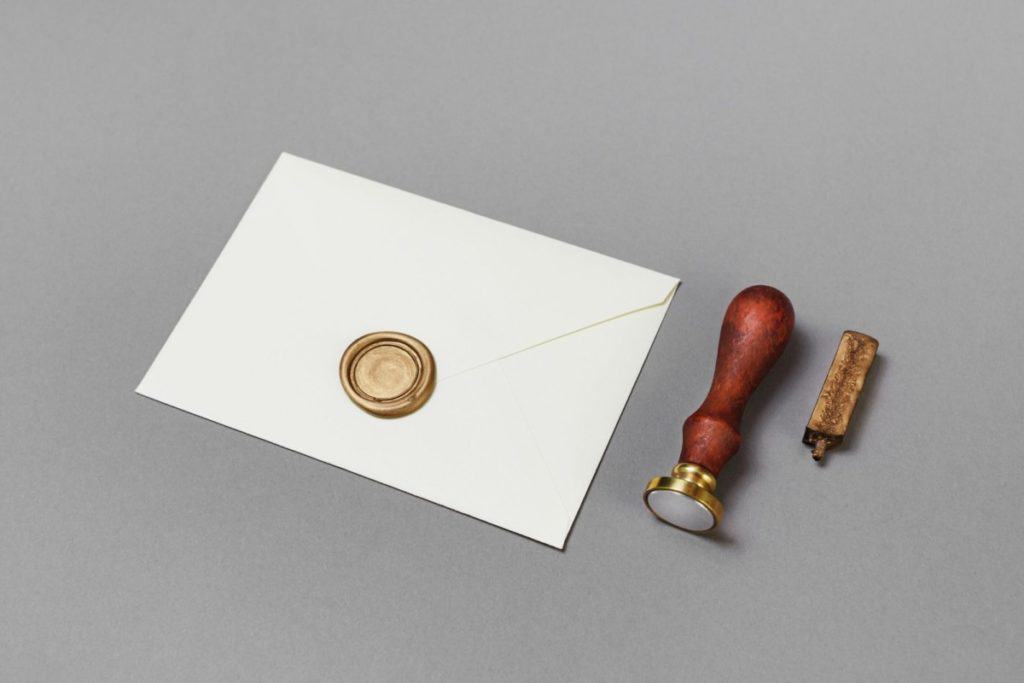(**) Disclosure: This post may contain affiliate links, meaning RealEstateCareerHQ.com will get a commission if you decide to make a purchase through the links, but at no additional cost to you.
To become a notary loan signing agent in Washington, an applicant must submit the notary public application to the Washington State Department of Licensing, pay the registration fee, get a surety bond, a notary stamp and a journal.
So what does a loan signing agent do in Washington? When people are getting a mortgage to purchase a house, or they need to refinance their property, there will be loan documents involved.
Your role as a notary loan signing agent is to walk through the set of loan documents with the borrower and verify the identity of the signer at the time of the signature. Then you would place the notary stamp on the signed documents, and send them back to the escrow company.
But keep in mind that you should NOT be providing legal advice, and you cannot explain the terms of the loan documents to the borrower.
In this guide, you’ll find the steps to become a notary loan signing agent in Washington. You’ll also learn the FAQ about this profession and income updates.
Note that this guide is for general information only and not to provide any professional advice. Although I’ve tried to put down info as accurate as I could possibly find, you should always refer back to the Washington State Department of Licensing and the State law.
So let’s go through the notary loan signing career in Washington.
Would you like to learn how to make $75 to $200 per signing appointment? You must check out the Loan Signing System from Mark Wills. (**) This is one of the best training programs for loan signing agents. Many students have achieved remarkable business success after taking this program.
6 Steps to Become a Notary Loan Signing Agent in Washington

Step 1: Meet the state-eligibility requirement
- At least 18 years of age
- Legal resident of Washington or have a place of employment or practice in the state
- Able to read and write English
Step 2: Purchase a surety bond

The Washington State Department of Licensing requires you to purchase a 4 years term $10,000 surety bond. You may get it from a licensed bonding or insurance company.
Note that the surety bond is to protect those for whom the notary public performs a notarization, but not you as a notary public.
If you need coverage for your professional services, you should consider getting an Error & Omission insurance (E&O).
I just checked with a surety bond issuer. The cost for a bond amount of $10,000 is $45. Their option would include $5,000 E&O coverage.
If you want to increase the E&O coverage to $30,000, then the total cost would be $115. (This option also includes the $10,000 bond amount)
Step 3: Complete the Notary Public Commission Application

You need to fill out the Notary Public Commission Application (Form NP-659-007). The questions on the application are pretty strict forward—for example, your name, business address, driver license, background info.
You could apply online through the SecureAccess Washington System (SAW). They have the option for you to upload all the required documents.

In addition to the application, you’ll need to provide a copy of the surety bond and complete the oath of office form.
This form needs to be signed and stamped by a licensed Notary Public. Basically, it’s a way of showing that you swear whatever you put in the application is true and accurate. Also, you will comply according to the notary act and State Laws.
You could search for a notary public on Google. Once you locate one, it’s better to confirm their license on the WA notary license database.
There is a filing fee of $30. That could be paid with a credit card if you are applying online.
For a paper application, you could pay with a cheque or money order, payable to the Department of Licensing. Then you could mail the completed set of application to:
- Notary Public Program, Department of Licensing
- PO Box 3777, Seattle WA 98124-3777
But frankly, I would suggest using online registration whenever possible. Not only that, it could lead to quicker turnaround time, but using less paper is also good for the environment.
Step 4: Receive the notary public commission certificate

Once Washington State Department approves your application, they will send you the notary public commission certificate through email.
After you receive the certificate, it’s better to review and confirm all the details are correct. (e.g., your name, county of residence, commission dates).
Step 5: Get the notary business supplies

Notarize documents with a standardized seal
You may purchase the notary seal from office supplies store. If you do, they may require you to show the notary public commission certificate.
But make sure that their seal would meet the Washington State Department’s requirement as according to the RCW 42.45.150 and WAC 308-30-070.
An official seal or stamp shall conform to the following requirements:
(1) The seal or stamp shall include the following information:
(a) The words “notary public”;
(b) The words “state of Washington”;
(c) The notary public’s name as commissioned;
(d) The notary public’s commission expiration date; and
(e) The notary public’s commission number.
(2) The type on this seal or stamp shall be a minimum of 8 point type.
(3) The seal or stamp shall conform to the following physical requirements:
(a) The seal or stamp shall be minimum one and five-eighths inches diameter if circular, or one inch wide by one and five-eighths inches long if rectangular;
(b) The face of the seal or stamp shall be permanently affixed; and
(c) If the stamp is affixed to a tangible record, it shall be applied in permanent ink and shall be capable of being photocopied.
(4) The seal or stamp shall not contain the Washington state seal.
Quote from Washington State Legislature WAC 308-30-070
Maintain a good record of business practice

Washington State Department require you to maintain a book of record. Not only it is an essential part of good business practice, but it also acts as proof that you have taken reasonable steps to identify the signer of a document.
The journal needs to be a permanently bound journal because their pages are more difficult to remove or lose than loose-leaf pages.
It also needs to be in numbered pages. The entries should consist of :
- What is the method you verify the signer’s identity?
- What is the date and time of the notarization?
- What is the document or act being notarized?
- What is the full name, address, and signature of each person requesting the notarization?
Furthermore, you must maintain the record for at least 10 years following the date of notarization.
You may find it at the surety bond company, office supply stores, or through notary organizations. You must keep both the seal and book record in a locked and secured area, where only you have direct and exclusive control of it. (e.g. a locked drawer or cabinet.)
Step 6: Become an electronic notary endorsement

One thing I really like about this industry in Washington is the availability of Electronic Notary. Doing so could bring you great convenience to streamline your notary practice.
However, you still need to meet the signer physically at the time of the notarization. At the time I’m writing this post, using audio-visual conference is not permitted.
To apply, you need to fill out the Notary Public Electronic Notarization Endorsement Application (Form NP-659-005). To make sure that the software you use complies with the WA Department’s standard, you need to write down the name of the technology provider on the form.
There is a $15 filing fee. Once again, you could apply online or mail the required documents to the WA State Department of Licensing.
Alternatively, you could just apply it all together with the notary public and use the same form. (Form NP-659-007). It has a checkbox for you to do that, and the total fee would be $45.
Being a Electronic Notary Public not only that is a lot more convenient for record-keeping and delivery of completed documents, but less paper usage is good for the environment too.
How much do notary loan signing agents make in Washington?
The average annual income of Notary Loan Signing Agents in Washington is $54,406. The income typically ranges between $32,367 to $65,813. Top earning loan signing agents in Washington are making over $98,181.
As a notary, you could work on different documents, but the loan signing in the real estate market could be a lucrative niche.
Can you make over $10,000/month as a loan signing agent? Be sure to check out our notary earning guide. You’ll find a case study where a loan signing agent has built her business to such a successful figure.
Source: ZipRecruiter – March 14, 2022
Is there demand for notary loan signing agent in Washington?
As long as people are obtaining mortgages or refinancing their homes, there would be a demand for notary loan signing agents in Washington. According to the Washington State Notary Public Guide, there are over 70,000 notary public in the state.
All originated mortgages in Washington
| YEAR | All originated mortgages |
|---|---|
| 2017 | 230,076 |
| 2016 | 263,712 |
| 2015 | 218,772 |
| 2014 | 166,279 |
| 2013 | 246,580 |
| 2012 | 287,748 |
| 2011 | 205,550 |
| 2010 | 241,128 |
| 2009 | 286,416 |
| 2008 | 207,841 |
| 2007 | 310,267 |
Source: Consumer Financial Protection Bureau – Home Mortgage Disclosure Act (HMDA) (April 17, 2020)
Furthermore, some states are “Attorney states,” which means only an attorney can handle the closing paperwork. Whereas, others are “Escrow States” where a loan signing agent can do the work.
According to the First American Title, Washington is a not an “Attorney State,” which is good news if you are interested in starting a notary loan signing business.
What education do you need to become a Washington notary public?

There is no official education requirement to become a notary public in Washington. However, it would be extremely helpful to learn about the proper notary act.
The first thing you could do is to read over the “Washington State Notary Public Guide.” (You’ll find its link at the reference section at the end of this post.)
This is a 50-pages guide which covers:
- The Licensing and Renewal Process
- How to Notarize
- Electronic Notarial Acts
- Specific Notarial Acts
- Washington Laws and Rules
- FAQ
Alternatively, you could take training courses from notary education providers. These are the companies I found the WA State Department website.
- American Society of Notaries (850.671.5164; asnnotary.org)
- Attorney & Notary Supply of Washington, Inc. (800.572.1689; ansofwa.com)
- LMI Notary Educational Service (800.886.5299; beanotary.com)
- National Notary Association (800.876.6827; nationalnotary.org)
- Notary Learning Center, Inc. (800.909.9003; notarylearningcenter.com)
- Notary Law Institute (800.722.8708; notarylaw.com)
- Notary.net (888.263.1977; notary.net)
If you want to succeed in the loan signing industry, you must check out this loan system training program. If you review the testimonials of his students, you’ll be amazed at how the notary career changes their life after they learned from Mark Wills. (**)
Is there a exam to become a notary in Washington?
No, there is no examination requirement to become a notary public in Washington.
How much does it cost to become a notary loan signing agent in Washington?

It costs approximately $192 to become a notary loan signing agent in Washington. Here’s the breakdown:
- Application fee ($45) (Including electronic notary endorsement)
- Notary Bond with E&O coverage ($115)
- Notary seal ($17)
- Business journal ($15)
There could be other expenses involved, such as travel expenses, and other business supplies. Also, if you are going to become an electronic notary endorsement, there could be an additional cost for technology.
How long does it take to become a notary signing agent in Washington?

Assume all required documents and payment are in good order, then it would take at least 30 days to to become a notary loan signing agent in Washington.
Can a felon be a notary loan signing agent in Washington?
Having a conviction for a felony may impact the application to become a notary loan signing agent in Washington. The Washington State Department of Licensing needs to make sure that you are a person with credibility, truthfulness, and integrity to fulfill the responsibilities of the position.
Therefore, they would reject application for anyone who committed a felony or gross misdemeanor relating to the practice of a notary (e.g, a theft conviction) within the past 10 years.

Having a felony does not necessarily mean your application will automatically be declined. It depends on the severity and nature of the conviction. The WA State Department would review it on a case-by-case basis.
How to renew the notary public certificate in Washington?

You need to renew the notary commission every four years. To do so, you can renew online through the SAW system. You can also submit the Form NP-659-006 within 120 days that your current notary commission expire. But to avoid an interrupted business period, don’t wait too close to the last minute.
The online notary public commission would have the same expiry date.
Once again, you’ll need to get a $10,000 surety bond and pay the $45 filing fee (including the renewal fee of the electronic notary endorsement). Upon renewal, you’ll need to get a new notary seal and destroy the old one so that it would not be misused.
Can I notarize for a family member in Washington?
You must not notarize any documents where you have any financial or beneficial interest in the transaction. Therefore, notarizing a document for any family member could call into question, and such practice should be avoided.
I have more questions about being a notary loan signing agent in Washington, where could I obtain more details?
You may contact the Washington State Notary Program:
- Phone: (360) 664-1550
- Email: notaries@dol.wa.gov
- Website: www.dol.wa.gov/business/notary
- Mailing Address:
- Notary Public Program, Department of Licensing
- PO Box 9027, Olympia, WA 98507-9027
Disclaimer: The information in this post is for general information only, and not intend to provide any advice. They are subjected to change without any notice, and not guaranteed to be error-free. Some of the posts on this site may contain views and opinions from individual not related to JCHQ Publishing. They do not necessarily reflect our view or position.
(**) Affiliate Disclosure: Please note that some of the links above are affiliate links, and at no additional cost to you. Our company, JCHQ Publishing will earn a commission if you decide to make a purchase after clicking on the link. Please understand that we include them based on our experience or the research on these companies or products, and we recommend them because they are helpful and useful, not because of the small commissions we make if you decide to buy something through the links. Please do not spend any money on these products unless you feel you need them or that they will help you achieve your goals.
Reference:
- First American Title- Your Guide to Real Estate Customs by State (Source)
- Washington State Department of Licensing – Notary Public (Source)
- Washington State Notary Public Guide (Source)
- Salary.com – Notary Signing Agent Salary in Washington (Source)
- ZipRecruiter – Loan Signing Agent Salary in Washington (source)
- Consumer Financial Protection Bureau – Home Mortgage Disclosure Act (HMDA) (Source)
- Suretybonds.com – Washington Notary Bond (Source)

